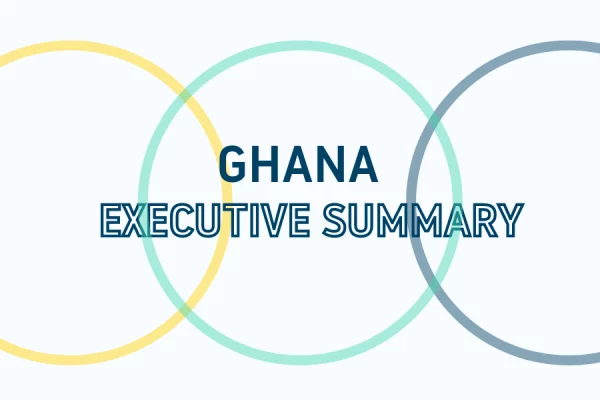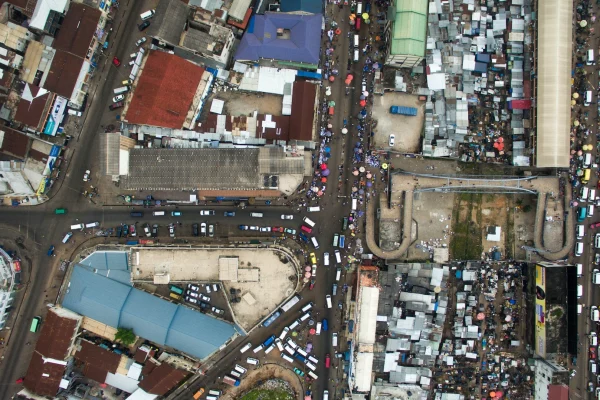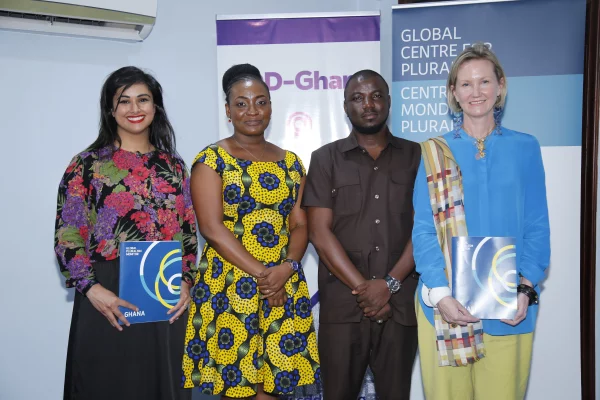Ghana
Ghana has implemented a raft of pluralistic policies. However, the reality shows an inability to protect these rights and prevent discrimination.
02.06.2023
Assessed Groups
- Ethnic Group(s)
- North-South Divide
- Religion
Ghana is often praised for being an example of democracy and peace in Africa. It has experienced eight consecutive elections without violence. This reflects an understanding that electoral competition is the only legitimate means to gain political power. However, Ghana is a country with numerous ethno-linguistic groups, religions and a north-south developmental divide. Ghana’s constitution fosters pluralism by guaranteeing the rights of all groups to exist and fully express themselves. Much of the population is also in favour of pluralistic values. In practice, discrimination based on ethnicity and gender is common, with diverse communities often facing obstacles for inclusion and representation in the political and economic spheres of society. Ghana has a mixture of legal commitments to pluralism but structural inequalities hamper progress. The Global Pluralism Monitor: Ghana report assesses the country’s commitment to inclusion and pluralism by focussing on ethnicity, religion, gender and the North-South divide. This assessment was completed in 2022.
Takeaways
Strong judicial and legal systems
Ghana’s Constitution recognizes and protects all social and cultural groups in the country from discrimination. These practices are ingrained in Ghana’s inclusive citizenship policies.
There are very few instances of individuals being denied citizenship based on race, ethnicity, religion or gender. Still, Fulani pastrolists are impacted by systemic exclusions to citizenship. Ghana has adopted and ratified numerous commitments on the rights of women, children and migrants, with some examples of successfully incorporating these treaties into the country’s domestic laws. While Ghana has a legal foundation that attempts to prevent discrimination across all diversity types, it struggles to administer and protect these rights due to a lack of political commitment and resources.
Practices and Leadership
Ghana has implemented pluralistic policies but faces challenges due to a lack of resources and political will. The country scores high in claims-making and contestation but many citizens are reluctant to participate in protests due to the partisan nature of politics.
Despite this, Ghana does well in representing diverse voices throughout both the media and its political parties, which are committed to reflecting the nation’s ethnic, cultural and religious make-up. Still, more can be done to ensure further representation of marginalized voices. Ghana’s civil society is vibrant and independent but faces challenges due to decreased foreign contributions and increased competition.
Socioeconomic disparities and the north-south divide
The Monitor report highlights socioeconomic issues and low intergroup trust in Ghana. This includes disparities in access to education and healthcare based on economic factors and gender.
The South outperforms the north economically. The north experiences increasing levels of poverty, particularly affecting women. Many women and adolescents migrate to the south for economic opportunities. While there appears to be an acceptance of diverse ethnic groups, the treatment of Fulani pastoralists highlights the ongoing challenge of systemic exclusion and stigmatization. These challenges in turn exacerbate intergroup relations as well as religious and regional divides.
Drivers of Pluralism in Ghana
These best practices are driving and enhancing pluralism in Ghana.
Diverse Political Leadership
Major political parties include broad ethnic representation and governing parties try to make appointments ethnically diverse.
Vibrant Civil Society
CSOs hold governments, political parties, and religious groups accountable to pluralistic values outlined in the constitution. This contributes to peace and stability in Ghana.
Acceptance of Groups
Ghanaians tend to exhibit a relatively high level of tolerance for various social groups, including ethnic minorities. There is a strong tradition of inter-religious harmony.
Recommendations
Tackling inequalities
Ghana can work to recognize the inequalities at the heart of the society. There is a need to implement national policies that foster inclusiveness to help create a more pluralistic society in Ghana. The country can work to limit the negative impacts of development on socio-economic equality and intergroup relationships.
Affirmative Action Bill
Ghana’s parliament has the potential to prioritize the passage of the Affirmative Action Bill to promote women’s equal participation and representation in politics and decision-making.
Media Regulations
The National Media Commission and the National Communications Authority have the opportunity to rigorously enforce media regulations. This would deter violations of broadcasting ethics that infringe on the rights of identity groups in the country.
Expansion of resources
Increased funding would better support state institutions responsible for promoting civic values, pluralistic ethics and social justice.

Scores
Legal Commitments
International Commitments
Average score: 9
Ghana has ratified several international treaties promoting pluralism and submitted reports to international monitoring mechanisms. It has taken steps to implement these commitments on a national level, but progress has been limited due to a lack of political commitment and resources. For example, while human rights institutions are established in Ghana, they are often undermined by limited resources and political interference.
National Commitments
Average score: 9
Ghana’s 1992 Constitution prohibits discrimination on the grounds of gender, race, colour, ethnic origin, religion, creed, or social or economic status. The Constitution guarantees the enjoyment of cultural rights and practices for all groups in the country. It also safeguards a wide range of rights and freedoms, including the right to life, personal liberty and participation in governance. The constitution has safeguards for minorities who may be excluded from political participation if additional provisions are not made.
Inclusive Citizenship
Average score: 8
In Ghana, citizenship is granted based on ancestry, allowing individuals with Ghanaian ancestry to become citizens, regardless of their ethnicity, race, religion or region of origin. Foreigners can also apply for citizenship through adoption, marriage or continued residence in the country which requires the individual’s assimilation into the Ghanaian way of life. Dual citizenship is now permitted but with restrictions related to holding certain government positions. Ghanaian citizenship is conceived inclusively by the wider society, but informal processes of social belonging can create obstacles to inclusive citizenship. The denial of citizenship to many Fulani pastoralists who cannot demonstrate that one of their parents was born in Ghana before independence reflects this systemic exclusion.
Practices
Policy Implementation
Average score: 5
Ghana has several statutory agencies responsible for implementing policies promoting pluralism. The Electoral Commission has made progress in organizing free and fair elections, while other institutions work to protect human rights and promote civic awareness. However, institutional performance varies due to factors such as government support, personal influence of agency heads, lack of funding, political polarization and multilateral agency support. For instance, Ghana’s progress towards gender parity in political office remains slow, with women constituting only 14.5 percent of representatives elected to Parliament in 2020.
Data Collection
Average score: 6
Data on socio-economic well-being and group-based inequalities are collected systematically and regularly throughout Ghana by statutory institutions, civil society organizations (CSOs) and private research institutions. These data sources are nationally representative and provide information on salient groups and social formations. However, there are major data collection challenges, including the quality of data collected and the extent that disaggregated data is readily available.
Claims-making and Contestation
Average score: 8
Ghana’s Constitution guarantees freedom of assembly, allowing interest groups to demonstrate and make demands in a peaceful manner. The government does not have the authority to hinder any group from engaging in protest. However, the police often seek to obstruct public protests by demanding a permit. Diverse groups can claim their rights by seeking legal redress from the law courts or organizing networks and coalitions. Nevertheless, the effectiveness of claims-making and contestation is undermined by low levels of citizenship engagement in Ghana and the deeply partisan nature of its politics.
Leadership for Pluralism
Political Parties
Average score: 7
Ghanaian political parties have made efforts to promote diversity by electing leaders from various ethnic, religious and gender backgrounds. All parties view diversity as a core value and reiterate this in their policy proposals and campaign platforms. Presidential tickets traditionally feature broad ethnic representation, with the president coming from the south and the vice-president from the north, as well as religious balance with a Christian presidential candidate and a Muslim vice-presidential candidate. While some instances of ethnically divisive comments have occurred, public backlash against these comments has been swift and strong.
News Media: Representation
Average score: 5
Ghana’s media landscape has become more vibrant since the 2001 repeal of the Criminal Libel and Seditious Libel Law. Privately-owned news outlets and radio stations are the most prominent forms of media engagement. There has been an increase in commercial radio stations broadcasting in local languages. Communities and regional radio stations exist in many parts of the country, allowing for higher participation in civil and political conversations. However, the media’s programming and coverage do not fully reflect the country’s diversity, and some critical voices refrain from the public discussion out of fear of political victimization.
News Media: Prominence of Pluralistic Actors
Average score: 5
Ghanaian media promotes pluralism and inclusivity but women face obstacles to being promoted in the profession, with few occupying senior management positions. Media discussions of gender-related issues often lack context. The media is criticized for reinforcing prejudices, with incidents of stereotyping and discriminatory reporting recorded in 2021.
Civil Society
Average score: 8
Ghana has a robust and diverse civil society that encompasses organizations dedicated to service delivery, advocacy, watchdog roles, governance and political participation. Despite their effort to ensure constitutional compliance and promote unity, pluralism and social inclusion, Ghanaian CSOs face challenges in retaining high-quality staff and securing funding. CSOs that focus on gender equality, governance and peaceful co-existence, as well as professional associations, are among those that have contributed to Ghana’s freedoms. However, competition for funds has led to a lack of networking and coalition-building among them.
Private Sector
Average score: 6
The private sector in Ghana constitutes 85.6 percent of businesses and is mainly composed of small and medium-sized enterprises. These enterprises tend to operate in sectors that are highly informal and vulnerable. There is a concentration of private sector establishments in the southern part of Ghana, with Greater Accra and Ashanti regions having the most. There is a significant deficit in women’s representation in managerial or decision-making roles on boards.
Group-based Inequalities
Political
Average score: 6
Identity, such as ethnicity, religion and gender, have influenced political affiliation and participation throughout Ghana’s history. Ethno-regional political parties were banned after independence, but this has not resolved the exclusion of certain groups in politics. The Christian majority in Ghana dominates politics, while women remain underrepresented. While an Affirmative Action Bill seeking to remedy the situation exists, it has continued to be debated for over a decade. The National Democratic Congress (NDC) appears to be more inclusive than the New Patriotic Party (NPP), but politicians from the north of the country lack power in both parties.
Economic
Average score: 4
Ghana has experienced economic growth and poverty reduction since the mid-1980s but inequality is rising between the north and south of the country. Poverty rates in the three northern regions are the highest nationally, and women in the north suffer more due to low income activities and a lack of access to land and credit. The informal sector absorbs over 80 percent of Ghana’s labour force, where wages are low, and women earn about 70 percent of what men earn. Natural resources are owned by the state and access to land is determined by customary practices, with men having greater and more secure access than women. Access to financial services has been increasing, driven largely by the growth of informal financial services such as mobile money.
Social
Average score: 4
In Ghana, access to primary education is high with a gross enrolment rate of 103.44 in 2021. Enrolment at the secondary level is also at an all-time high with an enrolment ratio of 77.67. Access to healthcare has improved but important gaps remain. Only 14.3 percent of the population has access to tertiary health care. The National Health Insurance Scheme covers over 95 percent of expenditures but patients still have to pay substantial costs and the quality of care is generally deemed poor. Significant inequalities in both education and health exist between the north and south and across rural-urban divides.
Cultural
Average score: 8
Ghana is a diverse country with multiple ethnic groups, cultures and religions. The government has attempted to link cultural diversity with development and promote unity alongside cultural diversity. Ghana exhibits a high level of tolerance for social groups, but there are instances of ethnic stereotyping and discrimination. women remain the target of discrimination and harmful traditional practices. Ghana has a tradition of inter-religious harmony, but African traditional religions are often stereotyped as pagan.
Access to Justice
Average score: 6
Ghana has a relatively strong justice system with laws and structures in place for access to justice. There are challenges that hinder access, including high costs and delays in the criminal justice system. The poor often do not get fair treatment due to a lack of resources and assistance in the justice system, which is compounded by judicial corruption. Despite these challenges, Ghana established initiatives like the Domestic Violence Fund and Alternative Dispute Resolution Act to help improve access to justice.
Intergroup Relations and Belonging
Intergroup Violence
Average score: 6
Ghana experiences occasional outbreaks of violence due to ethnic, religious and cultural grievances. Ethnic-related violence is the most common, often stemming from disputes over power and autonomy. This affects settler and migrant groups, Fulani herdsmen and foreign traders, reflecting important stressors impacting these groups.
Chieftaincy disputes are a major source of violence. Some religious conflicts also occur. However, conflicts between different groups are less prevalent than intragroup conflicts (conflict within groups).
Intergroup Trust
Average score: 4
A survey conducted by Afrobarometer (Round 8) shows that Ghanaians have high levels of mistrust, with only 8.5 percent believing that most people can be trusted. Distrust for specific groups of people is lower, with 46 percent expressing distrust of people from other ethnic groups and 36 percent saying they do not trust people with different religious affiliations. Inter-ethnic marriages in Ghana are low at 19 percent. Interfaith marriages are generally accepted, with 40 percent of Christians and 24 percent of Muslims saying they would be comfortable if their children married someone from a different faith.
Trust in Institutions
Average score: 4
Ghanaians are skeptical of and exhibit a lack of trust in public institutions. While the public has little confidence in the state-provided health care system, formal education is more trusted, and the introduction of the Free Senior High School Policy has seen increased enrollment. Trust in law enforcement is low due to corruption. Distrust of institutions is evident among marginalized women and girls who are reluctant to seek redress for gender-based violence.
Inclusion and Acceptance
Average score: 7
In Ghana, there is generally a high sense of belonging and inclusion. Most Ghanaians agree that communities are stronger when made up of people from diverse identity groups, and most respondents have not experienced unfair treatment from the government or other Ghanaians based on their group identity. The majority of Ghanaians also feel comfortable expressing their ethnic identity in public.
Shared Ownership of Society
Average score: 4
Ghanaians exhibit high levels of inclusion and acceptance but low levels of participation in social life, according to the Round 7 Afrobarometer survey. Only 21 percent are active members of voluntary/community groups and 35 percent are active members of religious groups. State resources are often controlled by political elites and their supporters, and political party foot soldiers demand rewards for their activism. This kind of political clientelism undermines citizens’ sense of ownership of society and undermines citizenship rights.


